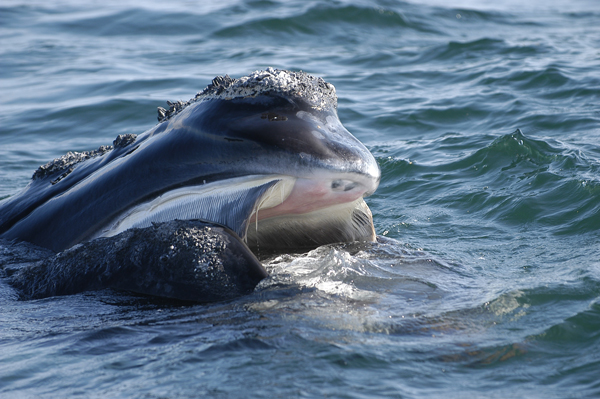International Marine Mammal Conservation
 North Atlantic right whale calf. NOAA and New England Aquarium scientists are working together on research aimed at improving conservation measures for this endangered whale species. Photo Credit: New England Aquarium. Photo taken under a Scientific Research Permit issued by NOAA.
North Atlantic right whale calf. NOAA and New England Aquarium scientists are working together on research aimed at improving conservation measures for this endangered whale species. Photo Credit: New England Aquarium. Photo taken under a Scientific Research Permit issued by NOAA.
 Scientists spot a Western gray whale breaching off the coast of Sakhalin-Island, Russia.
Scientists spot a Western gray whale breaching off the coast of Sakhalin-Island, Russia.
Marine mammals are distributed throughout the world’s oceans, so their conservation and recovery requires action on a global scale. As some of the top predators of the oceans, marine mammals play an important role in the food web and help ensure balance in the ocean’s ecosystem. Marine mammals face an array of threats from human activities, including bycatch in fishing gear, collision with vessels, depletion of prey resources, climate change, hunting, pollution, disease, and habitat degradation and loss. Global data on marine mammal bycatch is generally lacking, particularly species-specific data. For these reasons, marine mammals present an array of issues and challenges for conservation and management.
NOAA's Role in Marine Mammal Conservation
Despite these challenges, NOAA is committed to recovering and conserving marine mammals. NOAA Fisheries manages marine mammal populations in domestic waters by conducting research, assessing stocks, working with U.S. fishermen, and implementing restrictions, when necessary. Marine mammals are protected domestically and internationally under the Marine Mammal Protection Act (MMPA). Marine mammal species that are endangered or threatened are protected by the Endangered Species Act (ESA).
Setting the Stage Internationally
The United States continues to be a leader in promoting the conservation and management of marine mammals globally. We work internationally within regional fisheries management organizations and other international bodies, such as the International Whaling Commission, to promote the adoption of conservation and management measures for marine mammals. NOAA Fisheries also has a long history of working collaboratively with other nations to address international marine mammal conservation. We provide technical assistance to other countries in support of their marine mammal conservation efforts. These collaborative efforts include: negotiation and implementation of international agreements to protect and conserve marine mammals; sharing of scientific expertise through publications, international workshops, and participation in scientific committees of international research and management bodies; providing funds and technical expertise to build marine mammal research, management, and stranding response capacity in developing nations; and direct support for cooperative marine mammal research in international and foreign waters.
To focus our international work and better address the challenges facing marine mammals, we have released the International Marine Mammal Action Plan, identifying specific actions and projects to be undertaken over the next 3-5 years.
For questions about international marine mammal conservation, please contact Nina Young (nina.young@noaa.gov) or Melissa Andersen (melissa.andersen@noaa.gov).
MARINE MAMMALS FACTS—Did you know?
|



